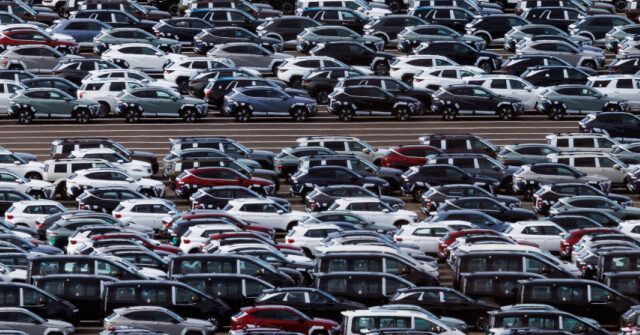Korean manufacturer Hyundai has confirmed plans to raise its investment in the United States by $2.7 billion, following an ICE raid that sent home 317 Korean employees who were improperly working at a Georgia construction site.
The investment is expected to double auto production at the company’s Ellabell, Ga., site from 200,000 autos per year up to 500,000 autos per year.
The Associated Press reported:
The company said it now plans to produce 10 models of electric and hybrid gas-electric vehicles in Georgia, up from the current two the plant has been assembling as it ramps up production. Hyundai says it’s still on track to expand production worldwide to 5.6 million vehicles a year by 2030. The automaker pledged that 60% of those vehicles will be electric or hybrid powered, targeting sales in South Korea, North America and Europe.
The announcement deflates many claims by pro-migration lobbyists and reporters who argued that enforcement of the nation’s migration and workplace laws would repel foreign investors who want to send their cheaper home-country workers into U.S. jobs.
On September 10, for example, CNN posted a headline saying “Hyundai raid shows Trump’s policies are getting in the way of his economic ambitions.” The text included a quote from a pro-migration advocate on Wall Street:
“The immigration and tariff policies are working at direct cross purposes with the effort to increase investment and construction here in the US, there’s no doubt about it,” said Mark Zandi, chief economist at Moody’s Analytics.
The New York Times reported on September 9:
“The current situation is creating a dilemma,” said Andrew Yi, a Seoul-based partner for Roland Berger, a consulting firm. Strict enforcement of certain visa rules “would in the short term delay the completion of the factories that are going up.”
Foreign companies are allowed to get L-1 visas to bring in their own foreign workers to help set up factories. There is no cap on L-1 visas, which are granted after company officials reassure U.S. embassy personnel that the foreigners are slated for short-term, specific, and specialized work, such as setting up production lines.
“I am seeing an environment of scrutiny of applications for individuals that are applying for visas [and] for greater scrutiny of immigrants’ individual status after they’ve gotten approved,” immigration lawyer Jorge Perez told IndustryWeek.com on September 18. “A lot of that vetting is going on,” he said, adding:
Let’s create [legal] mechanisms that allow us employers to legally bring in the talent that is not able to be found in the United States … That’s what really needs to occur. But I don’t think that right now that’s really the direction that the administration wants to go.
The Associated Press spotlighted that business-first demand for more foreign workers by ending its article with the claim: ”The goal,’ said MIT’s [Ben] Armstrong, ‘should be to make foreign direct investment as streamlined as possible.’”
In the Hyundai case, Korean employees used B-1/B-2 tourist and business travel visas and the Electronic System for Travel Authorization (ESTA) no-visa side door to get into the United States. Those approvals do not allow foreign employees to work jobs in the United States.
However, immigration lawyers suggest they can use complex visa laws and layers of staffing companies to legally protect the executives who use imported migrants for regular jobs instead of hiring Americans.
The New York Times reported that many of the Koreans’ jobs would be done by Americans:
Barry Zeigler, business manager of Local 188, a union that represents plumbers, pipe fitters, welders and HVAC service technicians for 15 counties in Georgia, said South Koreans were working as welders and pipe fitters in the Georgia plant — jobs that he said should have been given to Americans. He said he had visited the plant in the past, adding that about 65 members of his union were hired by subcontractors to lay pipes there, but were let go a few months ago.
“People think the Koreans are here to do a special job; that’s BS,” he said, adding that politicians had turned a deaf ear to his complaints about the factory until the raid.
Multiple Korean and Hyundai officials suggested they knew the Korean companies were evading U.S. laws.
“Donald Trump requires you to do it correctly,” Commerce Secretary Howard Lutnick declared to Axios.com on September 11. “[If] you want to bring workers here, go through the right process – you can’t skirt the rules anymore. That is over.”
Unsurprisingly, business groups and their allies are pushing President Donald Trump’s deputies to make it easier for foreign investors to send more foreign workers into U.S. jobs, via the complex variety of visas offered by the federal government.
“I’ve had good conversations with companies that are here doing business in Georgia, companies that are looking to do business here,” Georgia GOP Gov. Brian Kemp told reporters. “I’ve had good conversations with people in the White House about the visa issue.”
Read the full article here
